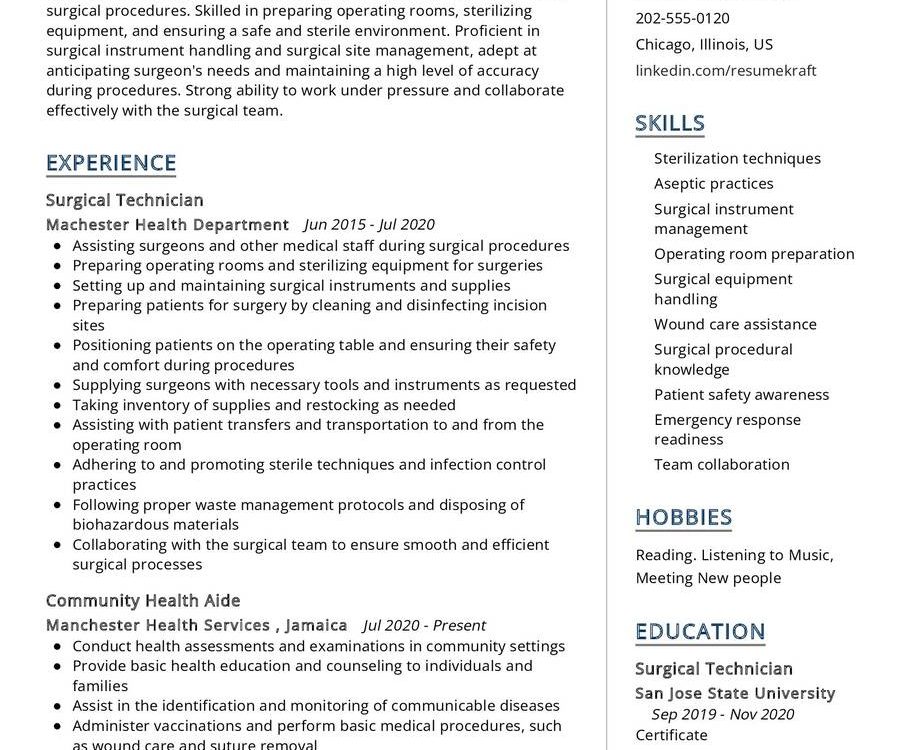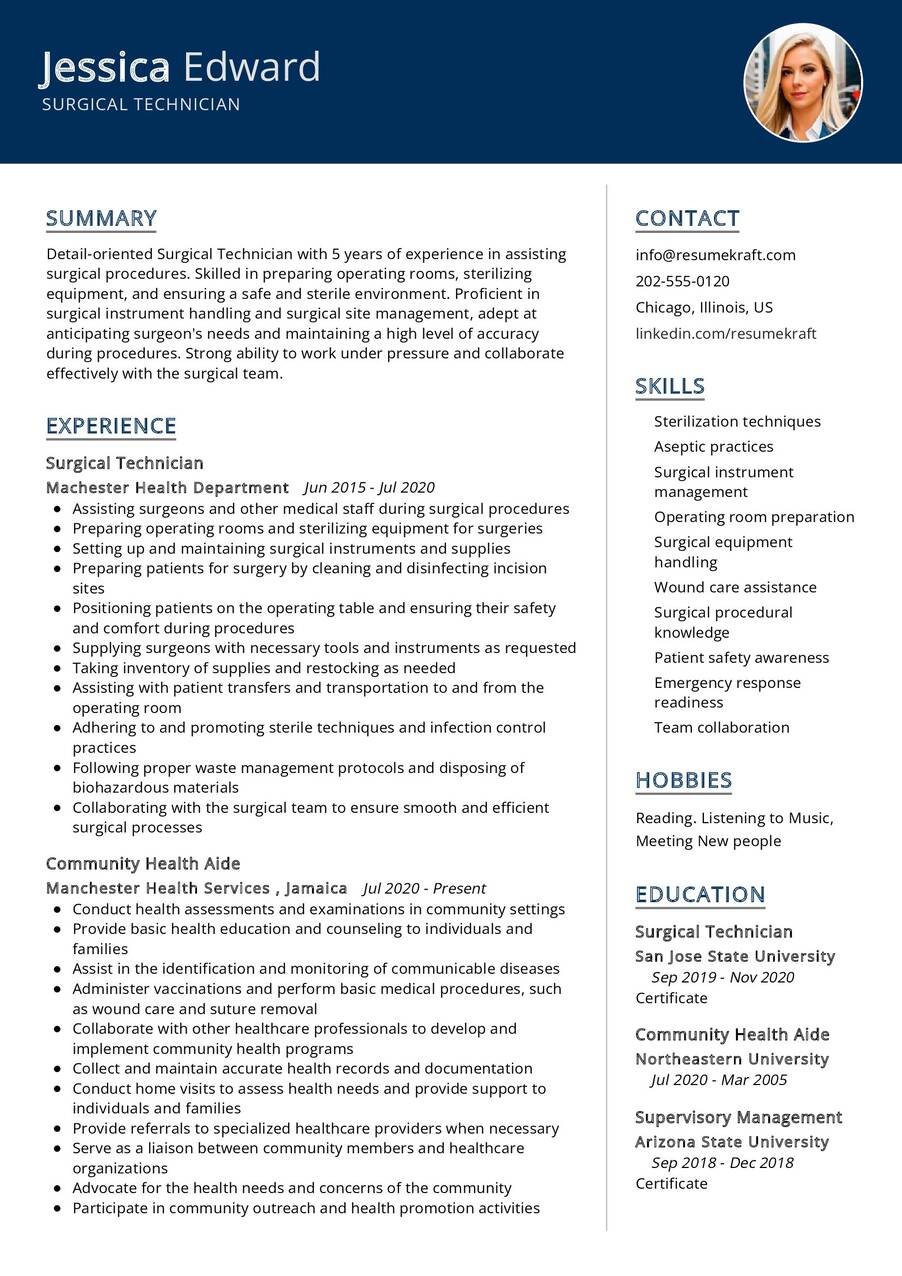Exploring the Crucial Role of a Surgical Technician
In the dynamic world of healthcare, the role of a Surgical Technician stands as a cornerstone in ensuring the smooth functioning of surgical procedures. This article will delve into the multifaceted responsibilities, required qualifications, and essential skills that define the position of a Surgical Technician.
Qualifications and Educational Background for a Surgical Technician
Embarking on the journey to become a Surgical Technician necessitates meeting specific educational and training requirements. Let’s explore the key qualifications:
- A completion of a Surgical Technology program from an accredited institution.
- Associate’s degree in Surgical Technology or a related field, showcasing a strong foundation in the medical domain.
- Certification from the National Board of Surgical Technology and Surgical Assisting (NBSTSA).
- Hands-on clinical experience gained through internships or practical training programs.
- Strong knowledge of surgical procedures, medical terminology, and sterile techniques.
- Effective communication skills and the ability to work well in a high-pressure environment.
Securing additional certifications, such as Certified Surgical Technologist (CST), can significantly enhance your profile in the competitive healthcare job market.
Roles and Responsibilities of a Surgical Technician
The role of a Surgical Technician is diverse, requiring a unique blend of technical expertise and teamwork. Here are the core responsibilities that define this crucial position:
- Preparing the operating room by ensuring all necessary equipment and supplies are available and sterile.
- Assisting the surgical team by handing them instruments and supplies during procedures.
- Maintaining a sterile field and adhering to aseptic techniques to prevent infections.
- Anticipating the needs of the surgical team, contributing to the efficiency of the operation.
- Collaborating with nurses, surgeons, and other healthcare professionals to ensure seamless communication during surgeries.
- Ensuring the proper disposal of surgical waste and cleaning and restocking the operating room after each procedure.
- Remaining up-to-date on advancements in surgical technology and procedures.
Each responsibility comes with its own set of challenges, making the role of a Surgical Technician both demanding and rewarding.
Crafting an Effective Surgical Technician CV
Your Surgical Technician CV is your gateway to landing a rewarding position in the healthcare field. Here are some tips to help you create a standout CV:
- Highlight your hands-on experience in diverse surgical procedures, showcasing your adaptability and expertise.
- Detail any specialized training or certifications you have acquired, emphasizing your commitment to continuous learning.
- Showcase your ability to work effectively in a team, providing examples of successful collaborations with surgeons, nurses, and other healthcare professionals.
- Quantify your achievements where possible, such as the number of successful surgeries you’ve assisted in or any efficiency improvements you’ve implemented in the operating room.
- Include a strong personal statement that reflects your passion for ensuring patient safety and contributing to successful surgical outcomes.
Your CV is not just a document but a representation of your skills, experiences, and commitment to excellence in surgical technology.
Surgical Technician Interview Tips
Preparing for a Surgical Technician interview requires careful consideration of the unique aspects of the healthcare industry. Here are some interview tips to help you succeed:
- Research the healthcare facility and understand its specific surgical procedures and protocols.
- Be prepared to discuss your experiences in handling emergency situations and your ability to remain calm under pressure.
- Showcase your communication skills by providing clear and concise responses to interview questions.
- Highlight your commitment to patient safety and your understanding of infection control measures.
- Ask questions about the facility’s surgical technology and equipment to demonstrate your interest and knowledge in the field.
By following these tips, you can confidently navigate the interview process and present yourself as a qualified and dedicated Surgical Technician.
Key Takeaways for Your Surgical Technician CV and Interview
As we conclude this comprehensive guide, let’s recap the key points to keep in mind while crafting your Surgical Technician CV and preparing for interviews:
- Emphasize your hands-on experience and expertise in diverse surgical procedures.
- Showcase your commitment to continuous learning through certifications and specialized training.
- Demonstrate your ability to work effectively in a team, a crucial skill in the collaborative healthcare environment.
- Quantify your achievements to provide concrete evidence of your impact in the operating room.
- Prepare thoroughly for interviews by researching the healthcare facility and showcasing your knowledge and passion for the field.
Finally, feel free to utilize resources like AI CV Builder, CV Design, CV Samples, CV Examples, CV Skills, CV Help, CV Synonyms, and Job Responsibilities to create a standout application and prepare for the Surgical Technician job interview.
Armed with these insights and tips, you are now ready to craft a CV that is a true reflection of your journey, your skills, and your aspirations. Remember, your CV is not just a document; it is a canvas where you paint your career story, a story of growth, learning, and dedication to the field of surgical technology. Best of luck!


